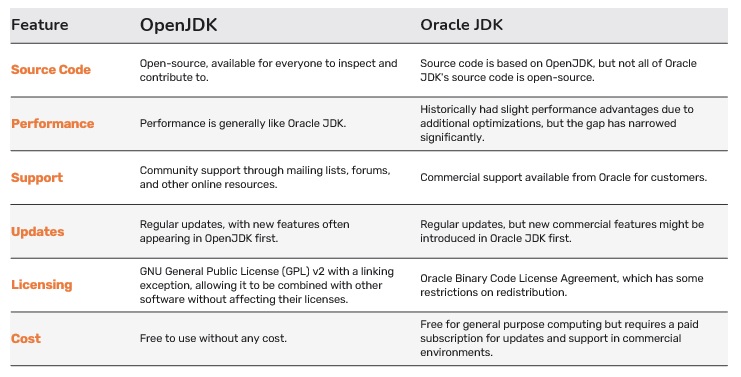Is oracle java the same as java or openjdk
Is oracle java the same as java or openjdk

I'd be happy to help clarify the differences between Oracle Java, OpenJDK, and Java!
To start with, let's define what Java is. Java is a programming language developed by Sun Microsystems (now owned by Oracle Corporation) in the mid-1990s. It was designed to allow developers to write programs that could run on multiple platforms without modification, making it an ideal choice for developing cross-platform applications.
Now, about Oracle Java:
Oracle Java refers specifically to the official implementation of the Java programming language provided by Oracle Corporation. This is the original Java runtime environment (JRE) and development kit (SDK) developed by Sun Microsystems and later acquired by Oracle. The Oracle JDK includes tools such as the compiler (javac), runtime environment (java), and documentation, which allow developers to compile, run, and debug their Java programs.
Oracle provides the Oracle JDK with its own set of libraries, APIs, and tooling, including features like garbage collection, exception handling, and multithreading support. The Oracle JDK is widely used in many industries and applications, such as Android app development, web servers, and cloud computing platforms.
About OpenJDK:
OpenJDK (Open Java Development Kit) is an open-source implementation of the Java programming language. It was created by Sun Microsystems in 2007 to provide a free and open alternative to Oracle's proprietary JDK. The OpenJDK project aims to produce a compatible implementation of the Java SE (Standard Edition) specification, which is designed to be fully interoperable with the Oracle JDK.
OpenJDK includes many of the same tools and libraries as the Oracle JDK, such as the compiler, runtime environment, and documentation. However, it is developed independently by the open-source community, which means that contributions and bug fixes can come from anyone who wants to participate. OpenJDK has its own set of maintainers and contributors, including individuals from companies like Azul Systems, Red Hat, and others.

Key differences between Oracle Java and OpenJDK:

What does this mean for developers? If you're looking for a free and open alternative to the Oracle JDK, OpenJDK might be an attractive option. However, keep in mind that the two implementations might have slight differences, which could affect compatibility or functionality in certain situations.
In summary:
Java is a programming language developed by Sun Microsystems (now owned by Oracle Corporation). Oracle JDK refers specifically to the official implementation of the Java programming language provided by Oracle Corporation. OpenJDK is an open-source implementation of the Java programming language aimed at providing a free and open alternative to the Oracle JDK.As a developer, you should consider your specific needs and goals before choosing between Oracle JDK and OpenJDK. While both are compatible with the Java SE specification, they have distinct differences in terms of licensing, development process, and interoperability.
What is the difference between Oracle Java and core Java?
I'm glad you asked!
Core Java refers to the fundamental programming language and concepts that are part of the Java platform, developed by Sun Microsystems (now owned by Oracle). Core Java is essentially a subset of Java technology that focuses on the programming aspects, such as syntax, semantics, and APIs, that allow developers to create applications that run on any platform that has a Java Virtual Machine (JVM) installed.
Core Java includes features like:
Syntax: The rules for writing Java code, including statements, keywords, identifiers, literals, and operators. Object-oriented programming (OOP): Concepts like classes, objects, inheritance, polymorphism, encapsulation, and abstraction are central to Core Java. APIs: Application Programming Interfaces that provide standardized access to functionality, such as input/output operations, data structures, algorithms, and networking.In contrast, Oracle Java refers specifically to the complete software development platform developed by Oracle Corporation. Oracle Java includes:
The Java Development Kit (JDK): A set of tools for developing, testing, and running Java applications. The Java Runtime Environment (JRE): A set of libraries and APIs that provide the runtime environment for executing Java bytecode. The Java Virtual Machine (JVM): The software layer that interprets and executes Java bytecode.Oracle Java includes everything in Core Java, plus additional features like:
Additional APIs: Oracle Java includes a wider range of APIs beyond those provided by the Java Standard Library (JSR-14), such as those for GUI programming, database access, web development, and more. Tools and Utilities: Oracle Java comes with a suite of tools and utilities for debugging, testing, and optimizing Java applications.Key differences between Core Java and Oracle Java include:
Scope: Core Java is focused on the fundamental language concepts and APIs, whereas Oracle Java encompasses the complete platform, including development tools and runtime environment. Content: Oracle Java includes additional features like APIs, tools, and utilities not present in Core Java. Purpose: Core Java is intended for developers who want to learn the basics of Java programming, while Oracle Java is aimed at professionals who need a comprehensive development environment for building complex applications.In summary, Core Java refers to the fundamental language concepts and APIs that form the basis of Java programming, whereas Oracle Java includes everything in Core Java plus additional features and tools for developing, testing, and running Java applications.





























